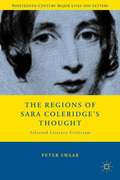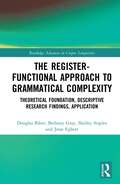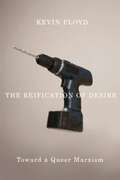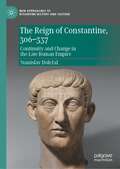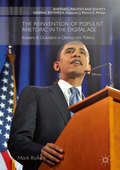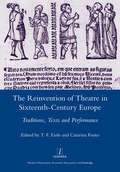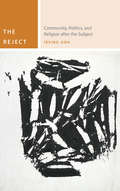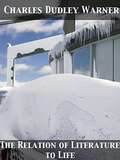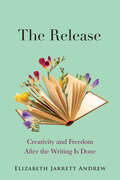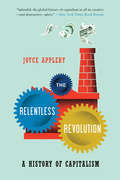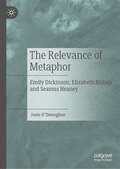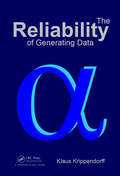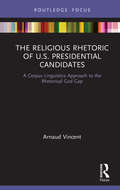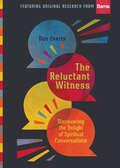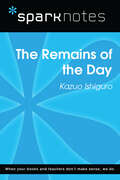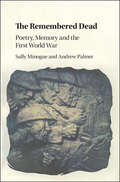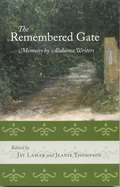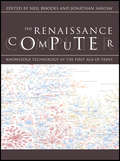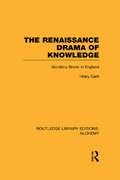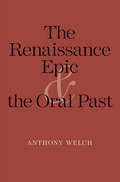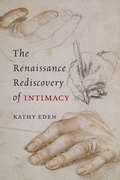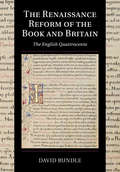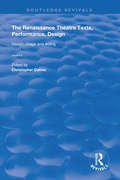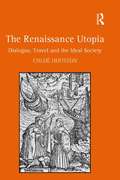- Table View
- List View
The Regions of Sara Coleridge’s Thought Selected Literary Criticism
by Peter SwaabThis book explores Sara Coleridge's critical intelligence and theoretical reach. It shows her in various critical guises: editing works by her father, Samuel Taylor Coleridge, commenting on her own poetry and prose, and writing diversely brilliant criticism of classical and English literature.
The Register-Functional Approach to Grammatical Complexity: Theoretical Foundation, Descriptive Research Findings, Application (Routledge Advances in Corpus Linguistics)
by Douglas Biber Bethany Gray Shelley Staples Jesse EgbertThis collection brings together the authors' previous research with new work on the Register-Functional (RF) approach to grammatical complexity, offering a unified theoretical account for its further study. The book traces the development of the RF approach from its foundations in two major research strands of linguistics: the study of sociolinguistic variation and the text-linguistic study of register variation. Building on this foundation, the authors demonstrate the RF framework at work across a series of corpus-based research studies focused specifically on grammatical complexity in English. The volume highlights early work exploring patterns of grammatical complexity in present-day spoken and written registers as well as subsequent studies which extend this research to historical patterns of register variation and the application of RF research to the study of writing development for L1 and L2 English university students. Taken together, along with the addition of introductory chapters connecting the different studies, the volume offers readers with a comprehensive resource to better understand the RF approach to grammatical complexity and its implications for future research. The volume will appeal to students and scholars with research interests in either descriptive linguistics or applied linguistics, especially those interested in grammatical complexity and empirical, corpus-based approaches.
The Reification Of Desire: Toward A Queer Marxism
by Kevin FloydThe Reification of Desire takes two critical perspectives rarely analyzed together—formative arguments for Marxism and those that have been the basis for queer theory—and productively scrutinizes these ideas both with and against each other to put forth a new theoretical connection between Marxism and queer studies.
The Reign of Constantine, 306–337: Continuity and Change in the Late Roman Empire (New Approaches to Byzantine History and Culture)
by Stanislav DoležalThis book explores the reign of Constantine the Great (306–337) and, more generally, the political history of the third century, thus putting Constantine's career and many of his decisions in context. It traces events under the first Tetrarchy and then explores Constantine's rise to power, his rule and reforms, and continuity and change with regard to his predecessors. It considers how he was able to transform the empire and establish his own dynasty, highlighting his political and military prowess, and therefore provides an essential overview of the political history of the period.
The Reinvention of Populist Rhetoric in The Digital Age
by Mark RolfeThis highly original work considers the rhetoric of political actors and commentators who identify digital media as the means to a new era of politics and democracy. Placing this rhetoric in an historical and intellectual context, it provides a compelling explanation of the reinvention and thematic recurrence of democratic discourse. The author investigates the populist sources of rhetoric used by digital politics enthusiasts as outsiders inaugurating new eras of democracy with digital media, such as Barack Obama and Julian Assange, and explores the generations of rhetorical and political history behind them. The book places their rhetoric in the context of the permanent tensions between insiders and outsiders, between the political class and the populace, which are inherent to representative democracy. Through a theoretical and conceptual research that is historically grounded and comparative, it offers rhetorical analysis of candidates for the 2016 presidential election and discusses digital democracy, particularly discussing their origins in American populism and their influence on other countries through Americanization. Uniquely, it offers a sceptical assessment of epochal claims and a historical-rhetorical account of two of the defining figures of twentieth-century politics to date, and reveals how modern rhetoric is grounded in an older form of anti-politics and mobilises tropes that are as old as representative democracy itself.
The Reinvention of Theatre in Sixteenth-century Europe: Traditions, Texts and Performance
by T.F. EarleThe sixteenth century was an exciting period in the history of European theatre. In the Iberian Peninsula, Italy, France, Germany and England, writers and actors experimented with new dramatic techniques and found new publics. They prepared the way for the better-known dramatists of the next century but produced much work which is valuable in its own right, in Latin and in their own vernaculars. The popular theatre of the Middle Ages gave endless material for reinvention by playwrights, and the legacy of the ancient world became a spur to creativity, in tragedy and comedy. As soon as readers and audiences had taken in the new plays, they were changed again, taking new forms as the first experiments were themselves modified and reinvented. Writers constantly adapted the texts of plays to meet new requirements. These and other issues are explored by a group of international experts from a comparative perspective, giving particular emphasis to one of the great European comic dramatists, the Portuguese Gil Vicente. Tom Earle is King John II Professor of Portuguese at Oxford. Catarina Fouto is a Lecturer in Portuguese at King's College London.
The Reject: Community, Politics, and Religion after the Subject (Commonalities)
by Irving GohThis book proposes a theory of the reject, a more adequate figure than the subject for thinking friendship, love, community, democracy, the postsecular, and the posthuman.Through close readings of Nancy, Deleuze, Derrida, Cixous, Clement, Bataille, Balibar, Ranciere, and Badiou, Goh shows how the reject has always been nascent in contemporary French thought. The recent turn to animals and bare life, as well as the rise of the Occupy movement, he argues, presents a special urgency to think the reject today.Thinking the reject most importantly helps to advance our commitment to affirm others without acculturating their differences. But the reject also offers, Goh proposes, a response finally commensurate with the radical horizon of Nancy’s question of who comes after the subject.
The Relation of Literature to Life
by Charles Dudley WarnerpubOne. info present you this new edition. The county of Franklin in Northwestern Massachusetts, if not rivaling in certain ways the adjoining Berkshire, has still a romantic beauty of its own. In the former half of the nineteenth century its population was largely given up to the pursuit of agriculture, though not under altogether favorable conditions. Manufactures had not yet invaded the region either to add to its wealth or to defile its streams. The villages were small, the roads pretty generally wretched save in summer, and from many of the fields the most abundant crop that could be gathered was that of stones.
The Release: Creativity and Freedom After the Writing Is Done
by Elizabeth Jarrett AndrewThe release is the stage when writers share the soul of their project—its gift. Here’s how to thrive and best serve your work once the writing is done.In The Release, award-winning author and teacher Elizabeth Jarrett Andrew invites writers to lift their heads out of the product-oriented sandbox and find an alternative way to play. By returning writers to their original delight and guiding them in an ongoing creative practice, Andrew helps form habits of mind, heart, and body to support a project’s final flourishing, free from the burdens of seeking validation and measuring worth.With the same skill and compassion she brought to her other resources for writers—Writing the Sacred Journey: The Art and Practice of Spiritual Memoir and Living Revision: A Writer's Craft as Spiritual Practice—Andrew writes with deep empathy for the emotional journey when a work is done, through celebration and grief, decisions around publication, the angst of receiving negative feedback or rejection, and the sometimes surprising challenges that come with success.Anyone—amateurs and professionals alike, those who intend to publish and those who do not, those with book-length manuscripts and those with haiku written on paper scraps—can do this practice. This book is for anyone who wants to release their work with love.
The Relentless Revolution: A History of Capitalism
by Joyce Appleby"Splendid: the global history of capitalism in all its creative--and destructive--glory."--The New York Times Book Review With its deep roots and global scope, the capitalist system seems universal and timeless. The framework for our lives, it is a source of constant change, sometimes measured and predictable, sometimes drastic, out of control. Yet what is now ubiquitous was not always so. Capitalism was an unlikely development when it emerged from isolated changes in farming, trade, and manufacturing in early-modern England. Astute observers began to notice these changes and register their effects. Those in power began to harness these new practices to the state, enhancing both. A system generating wealth, power, and new ideas arose to reshape societies in a constant surge of change. Approaching capitalism as a culture, as a historical development that was by no means natural or inevitable, Joyce Appleby gives us a fascinating introduction to this most potent creation of mankind from its origins to its present global reach.
The Relevance of Metaphor: Emily Dickinson, Elizabeth Bishop and Seamus Heaney
by Josie O'DonoghueThis book considers metaphor as a communicative phenomenon in the poetry of Emily Dickinson, Elizabeth Bishop and Seamus Heaney, in light of the relevance theory account of communication first developed by Dan Sperber and Deirdre Wilson in the 1980s. The first half of the book introduces relevance theory, situating it in relation to literary criticism, and then surveys the history of metaphor in literary studies and assesses relevance theory’s account of metaphor, including recent developments within the theory such as Robyn Carston’s notion of ‘the lingering of the literal’. The second half of the book considers the role of metaphor in the work of three nineteenth- and twentieth-century poets through the lens of three terms central to relevance theory: inference, implicature and mutual manifestness. The volume will be of interest to students and scholars working in literary studies, pragmatics and stylistics, as well as to relevance theorists.
The Reliability of Generating Data
by Klaus KrippendorffAll data are the result of human actions whether by experimentations, observations, or declarations. As such, the presumption of knowing what data are about is subject to imperfections that can affect the validity of research efforts. With calls for data-based research comes the need to assure the reliability of generated data. The reliability of converting texts into analyzable data has become a burning issue in several areas. However, this issue has been met by only a few limited, and sometimes misleading measures of the extent to which data can be trusted as surrogates of the phenomena of analytical interests. The statistic proposed by the author – "Krippendorff’s Alpha" – is widely used in the social sciences, not only where human judgements are involved but also where measurements are compared. The Reliability of Generating Data expands on the author’s seminal work in content analysis and develops methods for assessing the reliability of the kind of data that previously defied evaluations for this purpose. It opens with a discussion of the epistemology of reliable data, then presents the most basic alpha coefficient for the single-valued coding of predefined units. This largely familiar way of measuring reliability provides the platform for the succeeding chapters which start with an overview of alternative coefficients and then expand alpha one quality after another, including to cope with the reliabilities of multi-valued coding, segmenting texts into meaningful units, big data, and information retrievals. It also includes a chapter on how to diagnose and remedy imperfections and one on applicable standards, all converging on the statistical issues of the reliability of generating data. Features: Provides an overview of methods for assessing the reliability of generating data Expands a statistic proposed by the author, already widely used in the social sciences Includes many easy to follow numerical examples to illustrate the measures Written to be useful to beginning and advanced researchers from many disciplines, notably linguistics, sociology, psychometric and educational research, and medical science.
The Religious Rhetoric of U.S. Presidential Candidates: A Corpus Linguistics Approach to the Rhetorical God Gap (Routledge Advances in Corpus Linguistics)
by Arnaud VincentDrawing on corpus linguistic methods of analysis, this book critically examines the "rhetorical God gap" in American political discourse between the Democratic and Republican parties. The volume investigates the claims (which have often not been substantiated by quantitative data in the literature and have tended to focus on particular genres of political discourse) that there is a correlation between a higher degree of religiosity in Republican political discourse and voting preferences for the party and that Democratic politicians should engage in similar discourse toward "closing" the gap. The book adopts a keyword approach, using such techniques as collocation analyses, concordance reading, and Bible-specific N-gram identification, toward the study of a corpus of general campaign speeches over a 50-year period, and links findings from this data with social and cultural contextual factors to provide a more informed understanding of rhetorical patterns in religiously laden political language. The volume showcases the value of corpus linguistic methods in interrogating claims around political language and their broader applicability in linguistic research, making this key reading for students and scholars in corpus linguistics, critical discourse analysis, American politics, and religious studies.
The Reluctant Witness: Discovering the Delight of Spiritual Conversations (Lutheran Hour Ministries Resources)
by Don EvertsNew research finds that Christians are less involved in spiritual conversations today than we were twenty-five years ago. As society has changed, it seems we have become more uncomfortable talking with people about our faith. We are reluctant conversationalists. The reality is that many of our churches and communities are shrinking instead of growing. What can we do about this? Don Everts, himself a reluctant witness, grew up assuming that spiritual conversations are always painful and awkward. But after falling into one spiritual conversation after another, he was surprised to discover that they aren't. Don's surprising—and sometimes embarrassing—stories affirm what Scripture and the latest research reveal: spiritual conversations can actually be a delight. Unpacking what God's Word says about spiritual conversations and digging into the habits of eager conversationalists, Everts describes what we can learn from Christians who are still talking about their faith. With original research from the Barna Group and Lutheran Hour Ministries on spiritual conversations in the digital age, this book offers fresh insights and best practices for fruitful everyday conversations.
The Remains of the Day (SparkNotes Literature Guide Series)
by SparkNotesThe Remains of the Day (SparkNotes Literature Guide) by Kazuo Ishiguro Making the reading experience fun! Created by Harvard students for students everywhere, SparkNotes is a new breed of study guide: smarter, better, faster. Geared to what today's students need to know, SparkNotes provides: *Chapter-by-chapter analysis *Explanations of key themes, motifs, and symbols *A review quiz and essay topicsLively and accessible, these guides are perfect for late-night studying and writing papers
The Remarkable Journal of Professor Gunther von Steuben
by Daniel SchwabauerThe Remarkable Journal of Professor Gunther von Steuben offers a unique approach to journaling for elementary and junior high students.
The Remembered Dead: Poetry, Memory and the First World War
by Andrew Palmer Sally MinogueThe Remembered Dead explores the ways poets of the First World War - and later poets writing in the memory of that war - address the difficult question of how to remember, and commemorate, those killed in conflict. It looks closely at the way poets struggled to meaningfully represent dying, death, and the trauma of witness, while responding to the pressing need for commemoration. The authors pay close attention to specific poems while maintaining a strong awareness of literary and philosophical contexts. The poems are discussed in relation to modernism and myth, other forms of commemoration (photographs, memorials), and theories of cultural memory. There is fresh analysis of canonical poets which, at the same time, challenges the confines of the canon by integrating discussion of lesser-known figures, including non-combatants and poets of later decades. The final chapter reaches beyond the war's centenary in a discussion of one remarkable commemoration of Wilfred Owen.
The Remembered Gate: Memoirs by Alabama Writers
by Jay Lamar Jeanie ThompsonA collection of essays from 19 nationally known writers from Alabama, reflecting on artistic self-discovery and regional awareness.
The Renaissance Computer: Knowledge Technology in the First Age of Print
by Neil Rhodes Jonathan SawdayIn the fifteenth century the printing press was the 'new technology'. The first ever information revolution began with the advent of the printed book, enabling Renaissance scholars to formulate new ways of organising and disseminating knowledge. As early as 1500 there were already 20 million books in circulation in Europe. How did this rapid explosion of ideas impact upon the evolution of new disciplines? The Renaissance Computer looks at the fascinating development of new methods of information storage and retrieval which took place at the very beginning of print culture. And it asks some crucial questions about the intellectual conditions of our own digital age. A dazzling array of leading experts in Renaissance culture explore topics of urgent significance today, including: * the contribution of knowledge technologies to state formulation and national identity*the effect of multimedia, orality and memory on education*the importance of the visual display of information and how search engines reflect and direct ways of thinking.
The Renaissance Drama of Knowledge: Giordano Bruno in England (Routledge Library Editions: Alchemy)
by Hilary GattiGiordano Bruno’s visit to Elizabethan England in the 1580s left its imprint on many fields of contemporary culture, ranging from the newly-developing science, the philosophy of knowledge and language, to the extraordinary flowering of Elizabethan poetry and drama. This book explores Bruno's influence on English figures as different as the ninth Earl of Northumberland, Thomas Harriot, Christopher Marlowe and William Shakespeare. Originally published in 1989, it is of interest to students and teachers of history of ideas, cultural history, European drama and renaissance England. Bruno's work had particular power and emphasis in the modern world due to his response to the cultural crisis which had developed - his impulse towards a new ‘faculty of knowing’ had a disruptive effect on existing orthodoxies – religious, scientific, philosophical, and political.
The Renaissance Epic and the Oral Past
by Anthony WelchThis book offers a close survey of the changing audiences, modes of reading, and cultural expectations that shaped epic writing in the sixteenth and seventeenth centuries.According to Anthony Welch, the theory and practice of epic poetry in this period--including little-known attempts by many epic poets to have their work orally recited or set to music--must be understood in the context of Renaissance musical humanism. Welch's approach leads to a fresh perspective on a literary culture that stood on the brink of a new relationship with antiquity and on the history of music in the early modern era.
The Renaissance Rediscovery of Intimacy
by Kathy EdenIn 1345, when Petrarch recovered a lost collection of letters from Cicero to his best friend Atticus, he discovered an intimate Cicero, a man very different from either the well-known orator of the Roman forum or the measured spokesman for the ancient schools of philosophy. It was Petrarch’s encounter with this previously unknown Cicero and his letters that Kathy Eden argues fundamentally changed the way Europeans from the fourteenth through the sixteenth centuries were expected to read and write. The Renaissance Rediscovery of Intimacy explores the way ancient epistolary theory and practice were understood and imitated in the European Renaissance. Eden draws chiefly upon Aristotle, Cicero, and Seneca—but also upon Plato, Demetrius, Quintilian, and many others—to show how the classical genre of the “familiar” letter emerged centuries later in the intimate styles of Petrarch, Erasmus, and Montaigne. Along the way, she reveals how the complex concept of intimacy in the Renaissance—leveraging the legal, affective, and stylistic dimensions of its prehistory in antiquity—pervades the literary production and reception of the period and sets the course for much that is modern in the literature of subsequent centuries. Eden’s important study will interest students and scholars in a number of areas, including classical, Renaissance, and early modern studies; comparative literature; and the history of reading, rhetoric, and writing.
The Renaissance Reform of the Book and Britain: The English Quattrocento (Cambridge Studies in Palaeography and Codicology #17)
by David RundleWhat has fifteenth-century England to do with the Renaissance? By challenging accepted notions of 'medieval' and 'early modern' David Rundle proposes a new understanding of English engagement with the Renaissance. He does so by focussing on one central element of the humanist agenda - the reform of the script and of the book more generally - to demonstrate a tradition of engagement from the 1430s into the early sixteenth century. Introducing a cast-list of scribes and collectors who are not only English and Italian but also Scottish, Dutch and German, this study sheds light on the cosmopolitanism central to the success of the humanist agenda. Questioning accepted narratives of the slow spread of the Renaissance from Italy to other parts of Europe, Rundle suggests new possibilities for the fields of manuscript studies and the study of Renaissance humanism.
The Renaissance Theatre: Volume II: Design, Image and Acting (Routledge Revivals)
by Christopher CairnsOriginally published in 1999, this book is a critical analysis of Renaissance theatre, including chapters on speaking theatres, performing theatre and redesigning Shakespeare.
The Renaissance Utopia: Dialogue, Travel and the Ideal Society
by Chloë HoustonA study of European utopias in context from the early years of Henry VIII’s reign to the Restoration, this book is the first comprehensive attempt since J. C. Davis’ Utopia and the Ideal Society (1981) to understand the societies projected by utopian literature from Thomas More’s Utopia (1516) to the political idealism and millenarianism of the mid-seventeenth century. Where Davis concentrated on understanding utopias historically, Renaissance Utopia also seeks to make sense of utopia as a literary form, offering both a new typology of utopia and a new history of European humanist utopianism. This book examines how the utopia was transformed from an intellectual exercise in philosophical interrogation to a serious means of imagining practical social reform. In doing so it argues that the relationship between Renaissance utopia and Renaissance dialogue is crucial; the utopian mode of discourse continued to make use of aspects of dialogue even when the dialogue form itself was in decline. Exploring the ways in which utopian texts assimilated dialogue, Renaissance Utopia complements recent work by historians and literary scholars on early modern communities by providing a thorough investigation of the issues informing a way of modelling a very particular community and literary mode - the utopia.
